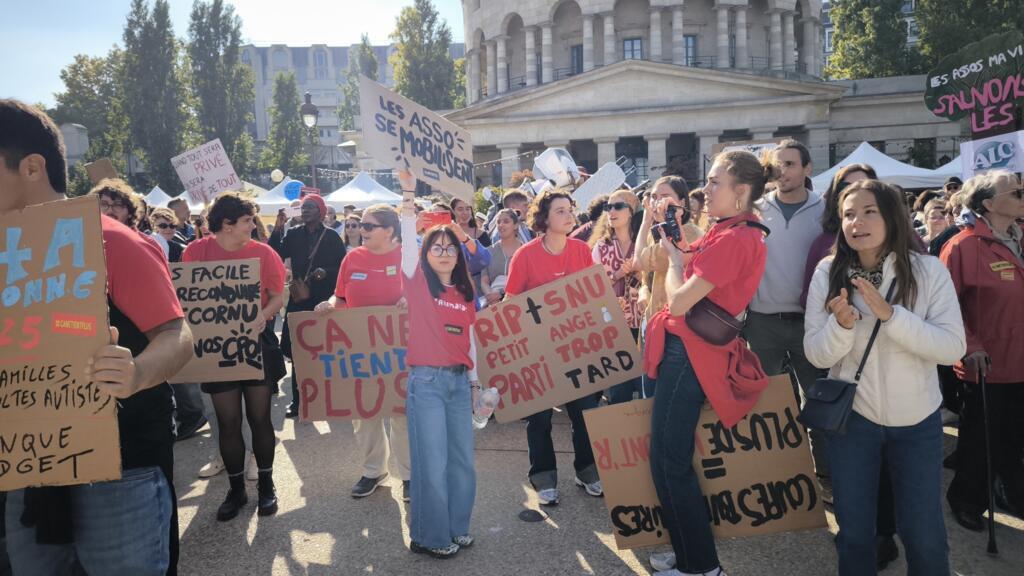
A budget crisis and shrinking public funding are squeezing France’s 1.4 million NGOs, and a new survey shows 30 percent of them lack sufficient cash flow, putting their work at risk.
The Mouvement associatif, which represents 700,000 French organisations, organised a protest on 11 October to deliver what it called “a wake-up call” to public authorities across France.
“We came to support each other because our activities are in danger,” said Florence Bouhmana, an employee of Solidarité Laïqu, an organisation that fights inequality and promotes access to education in France and abroad. “Ça ne tient plus - everything is falling apart,” she told RFI.
The Mouvement associatif points out that associations are facing increasing needs and rising costs due to inflation, while receiving fewer resources from public authorities in the midst of a “budget crisis".
Organisations working in international solidarity, including Solidarité Laïque, are also feeling the strain of partially frozen funding from the French Development Agency (AFD), the main public funder in this sector.
Funding cuts
These difficulties were highlighted in a survey across nearly 5,000 associations, whichwas first published in spring 2025 and recently updated.
According to this survey, 30 percent of the 1.4 million associations reported having little or no cash flow.
Following delays in some payments - due to the 2025 budget only being adopted in January - 58 percent reported a decrease in public funding, and 20 percent even mentioned complete cuts in subsidies from the state or local authorities.
France's debt: how did we get here, and how dangerous is it?
"People have had enough," said Lofti Ouanezar, CEO of Emmaüs Solidarité, lamenting the stagnant or declining resources despite growing hardship.
"We’re seeing more and more people on the streets, but also new groups - more women, young people, and poor retirees. For example, in our daytime shelter at Châtelet, we’ve gone from 200 to 300 people a day, but with the same resources. Yet we are the last safety net: after us, it’s the street!"
'A dynamic sector'
The situation also impacts a dynamic economic sector that employs 1.8 million people - 11 percent of the salaried workforce.
One in three associations had to reduce their payroll in 2025, according to the same survey. Claire Thoury, director of the Mouvement associatif, stated during a press conference ahead of the protest that the number of liquidations and rescue plans had doubled since 2022.
"We launched a redundancy plan just last week," confirmed Marc Dixneuf, CEO of AIDES, an organisation that has been fighting HIV and hepatitis for 40 years.
"Sixty-one jobs will be cut out of around 500, that’s 12 percent of our staff," explains the director. This is due to "600,000 euros in subsidies from the Health Ministry cut overnight, changes in pricing for testing and health centers and effects of the Ségur healthcare reforms."
In the middle of the crowd, Uriel Moulet walked around holding a sign that reads: "Do you have any questions?" The young woman works for CNAJEP, a coordinating body for youth and popular education organisations.
"When I was younger, I didn’t realise that many of the things I had access to - summer camps, community and youth information centers - were tied to associations," she explained.
"Sports, culture, youth, popular education, international solidarity, social services, the environment... associations are everywhere," she emphasizes. And "without them, society falls apart," reads a placard.
"Associations carry out part of the work of public services through delegation," explained Alexandra Cordobard, Socialist Party mayor of the 10th arrondissement of Paris, who came to support the protest. "So de-funding them also means abandoning those public policies."
Culture and sports sectors under pressure
The cultural and sports sectors, representing 25 percent and 20 percent of all associations respectively, are particularly under pressure.
A survey from May 2025 by the association of elected officials for sports (Andes) found that 43 percent of local governments cut their sports budgets this year.
Culture has been hit just as hard: almost half of local governments reduced their cultural budgets between 2024 and 2025, according to the Observatory of cultural policies (OPC).
France roiled by anti-austerity protests as unions demand budget rethink
At the national level, things haven’t been better. The government froze part of the Pass Culture funding for six months, and the Pass’Sport program, which gave discounts on sports club memberships, hasn't been available since September for kids aged 6 to 13.
Feminist organisations
Feminist organisations have also raised concerns. At the end of August, the Fondation des femmes (Women’s Foundation) warned of a "particularly critical" situation for associations supporting women victims of violence, at a time when demand continues to grow. A survey of 148 organisations found that over 70 percent reported worsening financial conditions in 2025.
"For years, feminist associations have been a lifeline for thousands of women experiencing violence. By cutting their funding, we’re closing that door - and leaving women to face their abusers. That’s a grave political failure, with consequences counted in human lives," Anne-Cécile Mailfert, president of the foundation, said.
"When associations are attacked, it’s the most marginalised people who are being attacked," added Sarah Durocher, president of Planning Familial, at the Mouvement Associatif’s press conference.
Like others, she criticised a growing climate of mistrust, exemplified by the "Republican Commitment Contract" (CER) introduced in 2021, which associations must sign to receive public funding or accreditation.
Some funding cuts are simply "political choices," she argued.
This is a view shared by Cordobard: "Now you also have to agree with the government to get support!" she warned, in reference to threatening statements made by former Interior minister Gérald Darmanin (in 2023) about funding for the Ligue des Droits de l’Homme (LDH).
"We need the associations doing the work," the mayor insisted. "In my arrondissement, food is distributed every night. If associations don’t do it, who will?"
This story was adapted from RFI's original version in French.







